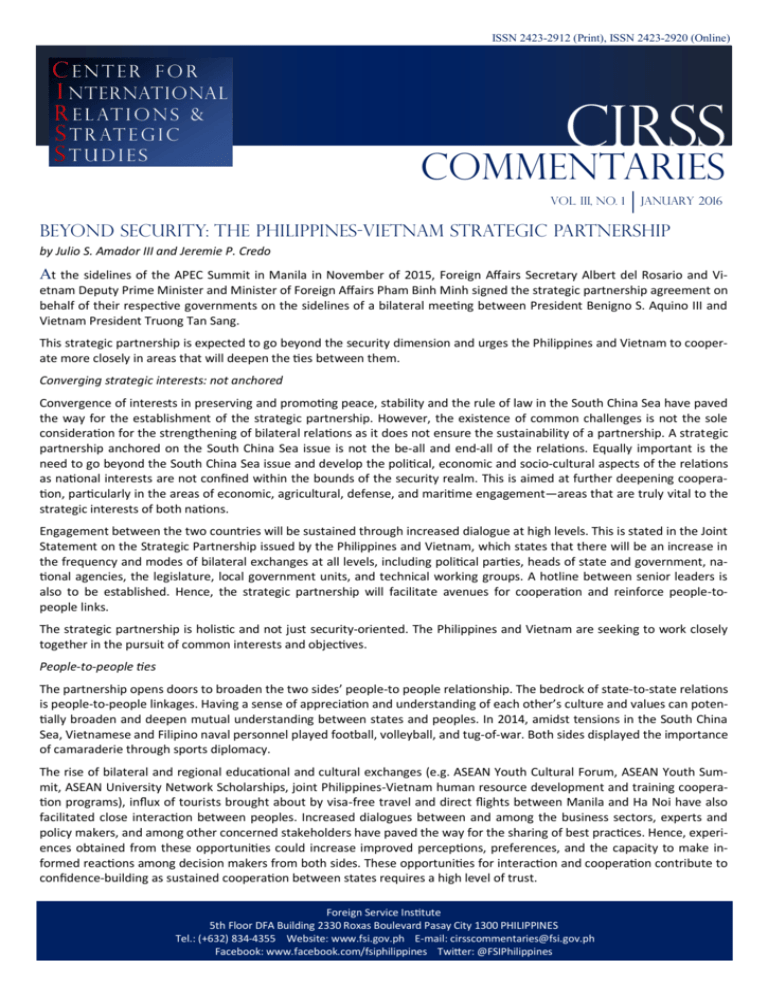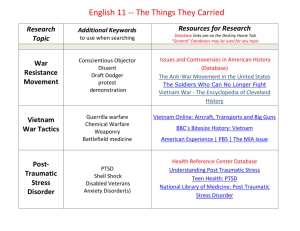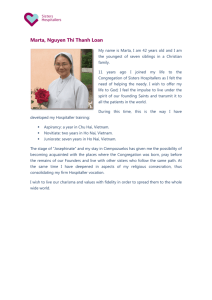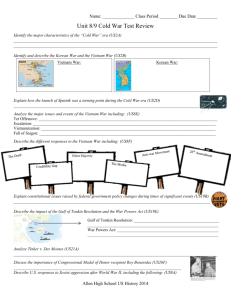
ISSN 2423-2912 (Print), ISSN 2423-2920 (Online)
cirss
commentaries
VOL. III, NO. 1
JANUARY 2016
Beyond security: the Philippines-Vietnam strategic partnership
by Julio S. Amador III and Jeremie P. Credo
At the sidelines of the APEC Summit in Manila in November of 2015, Foreign Affairs Secretary Albert del Rosario and Vietnam Deputy Prime Minister and Minister of Foreign Affairs Pham Binh Minh signed the strategic partnership agreement on
behalf of their respective governments on the sidelines of a bilateral meeting between President Benigno S. Aquino III and
Vietnam President Truong Tan Sang.
This strategic partnership is expected to go beyond the security dimension and urges the Philippines and Vietnam to cooperate more closely in areas that will deepen the ties between them.
Converging strategic interests: not anchored
Convergence of interests in preserving and promoting peace, stability and the rule of law in the South China Sea have paved
the way for the establishment of the strategic partnership. However, the existence of common challenges is not the sole
consideration for the strengthening of bilateral relations as it does not ensure the sustainability of a partnership. A strategic
partnership anchored on the South China Sea issue is not the be-all and end-all of the relations. Equally important is the
need to go beyond the South China Sea issue and develop the political, economic and socio-cultural aspects of the relations
as national interests are not confined within the bounds of the security realm. This is aimed at further deepening cooperation, particularly in the areas of economic, agricultural, defense, and maritime engagement—areas that are truly vital to the
strategic interests of both nations.
Engagement between the two countries will be sustained through increased dialogue at high levels. This is stated in the Joint
Statement on the Strategic Partnership issued by the Philippines and Vietnam, which states that there will be an increase in
the frequency and modes of bilateral exchanges at all levels, including political parties, heads of state and government, national agencies, the legislature, local government units, and technical working groups. A hotline between senior leaders is
also to be established. Hence, the strategic partnership will facilitate avenues for cooperation and reinforce people-topeople links.
The strategic partnership is holistic and not just security-oriented. The Philippines and Vietnam are seeking to work closely
together in the pursuit of common interests and objectives.
People-to-people ties
The partnership opens doors to broaden the two sides’ people-to people relationship. The bedrock of state-to-state relations
is people-to-people linkages. Having a sense of appreciation and understanding of each other’s culture and values can potentially broaden and deepen mutual understanding between states and peoples. In 2014, amidst tensions in the South China
Sea, Vietnamese and Filipino naval personnel played football, volleyball, and tug-of-war. Both sides displayed the importance
of camaraderie through sports diplomacy.
The rise of bilateral and regional educational and cultural exchanges (e.g. ASEAN Youth Cultural Forum, ASEAN Youth Summit, ASEAN University Network Scholarships, joint Philippines-Vietnam human resource development and training cooperation programs), influx of tourists brought about by visa-free travel and direct flights between Manila and Ha Noi have also
facilitated close interaction between peoples. Increased dialogues between and among the business sectors, experts and
policy makers, and among other concerned stakeholders have paved the way for the sharing of best practices. Hence, experiences obtained from these opportunities could increase improved perceptions, preferences, and the capacity to make informed reactions among decision makers from both sides. These opportunities for interaction and cooperation contribute to
confidence-building as sustained cooperation between states requires a high level of trust.
Foreign Service Institute
Foreign Service Institute
5th Floor DFA Building 2330 Roxas Boulevard Pasay City 1300 PHILIPPINES
5th Floor DFA Building 2330 Roxas Boulevard Pasay City 1300 PHILIPPINES
Tel.: (+632) 834-4355 Website: www.fsi.gov.ph E-mail: cirsscommentaries@fsi.gov.ph
Tel.: (+632) 834-4355 Website: www.fsi.gov.ph E-mail: cirsscommentaries@fsi.gov.ph
Facebook: www.facebook.com/fsiphilippines Twitter: @FSIPhilippines
Facebook: www.facebook.com/fsiphilippines Twitter: @FSIPhilippines
January 2016
VOL. III, NO. 1
Economic and socio-cultural cooperation
For the strategic partnership to be sustainable, both sides should also intensify their economic cooperation. Vietnam is a fast
-growing developing country with a GDP per capita of USD 2,052.3 as of 2014. 1 The country’s low wage and cost of utilities
have attracted foreign direct investments, especially in the export-oriented manufacturing sector. This has helped Vietnam
accelerate its economic growth to 6.0 percent in 2014. Vietnam’s main exports include telephones and mobile phones, textiles and garments, consumer electronics, footwear, crude oil and fishery.2 Moreover, Vietnam is one of the largest exporters of rice in the world (e.g. Vietnam supplies a third of the Philippines’ rice imports).3
As Vietnam’s government prioritizes the development of electronics, textiles, food
processing, agricultural machinery, and tourism industries, it is seen to be a bright
investment spot in Southeast Asia which the Philippines could take advantage of. Retail systems like supermarkets, traditional markets, shopping malls, and online services are identified as a developing sector in Vietnam. It is a potential market for investment activities along with the food and agricultural processing sector.4 Philippines-Vietnam economic relations could further progress when mutually favorable
conditions for the entry and expansion of investments, in accordance with respective
laws and regulations, are created and maintained.
“Equally important is the need to
go beyond the South China Sea
issue and develop the political,
economic, and socio-cultural
aspects of the relation as national
interests are not confined within
the bounds of the security realm.”
Moreover, the easing of restrictions on foreign investment in real estate in July 2015 is expected to revive the property market in Vietnam. These developments will likely result in an upsurge in demand for well-planned residential and commercial
properties, and therefore for professionals (e.g. architects, landscape designers, and engineers), technology transfer, and
more importantly, investment in the infrastructure sector (including telecommunications and electricity services).
On the socio-cultural front, as ASEAN integrates, the need for English language services will be crucial. This is an opportunity
for the Philippines to work with Vietnam in the field of education, particularly in English language skills training.
Further steps
Beyond the strategic concerns, the two sides agree that other functional areas are ripe for further cooperation and engagement. In the years ahead, the Philippines-Vietnam strategic partnership should bear fruit for the peoples of the two countries and benefit the wider ASEAN region through shared peace and stability.
Notes
1
The World Bank, “GDP per capita of countries” http://data.worldbank.org/indicator/NY.GDP.PCAP.CD (accessed December 17, 2015).
Vietnam Briefing, “Vietnam’s export and import industries,” (2015), http://www.vietnam-briefing.com/news/introduction-vietnams-export-importindustries.html/ (accessed December 28, 2015); and Vietnam Trade Promotion Agency, “Export” http://www.vietrade.gov.vn/en/index.php?
option=com_content&view=article&id=777&Itemid=77 (accessed December 18, 2015).
3
Export Marketing Bureau, “Philippine-Vietnam Bilateral Trade 2012-2013,” http://www.emb.dti.gov.ph/marketbriefs/vietnam.htm (accessed December 18, 2015).
4
Philippine Retailers Association, “Philippine enterprise seek investment opportunity in Vietnam’s retail market”, (August 2015), http://www.philretailers.com/
philippine-enterprise-seek-investment-opportunity-in-vietnams-retail-market/ (accessed January 4, 2016).
2
Julio S. Amador III is the Deputy Director-General of the
Foreign Service Institute. Mr. Amador can be reached at
jsamador@fsi.gov.ph
CIRSS Commentaries is a regular short publication of the
Center for International Relations and Strategic Studies
(CIRSS) of the Foreign Service Institute (FSI) focusing on the
latest regional and global developments and issues.
Jeremie P. Credo is a Foreign Affairs Research Specialist
with the Center for International Relations and Strategic
Studies of the Foreign Service Institute. Ms. Credo can be
reached at jpcredo@fsi.gov.ph
The views expressed in this publication are of the authors
alone and do not reflect the official position of the Foreign
Service Institute, the Department of Foreign Affairs and the
Government of the Philippines.
The Center for International Relations and Strategic Studies (CIRSS) of the
Foreign Service Institute (FSI) undertakes studies in support of the formulation, review,
and dissemination of Philippine foreign policy. It also organizes conferences,
roundtable discussions (RTD), lectures, and forums as channels for interaction, cooperation, and
integration of the efforts of local and foreign experts from government,
private and academic sectors on foreign policy issues and their domestic implications.
© 2016 by the Center for International Relations and Strategic Studies. All rights reserved.







